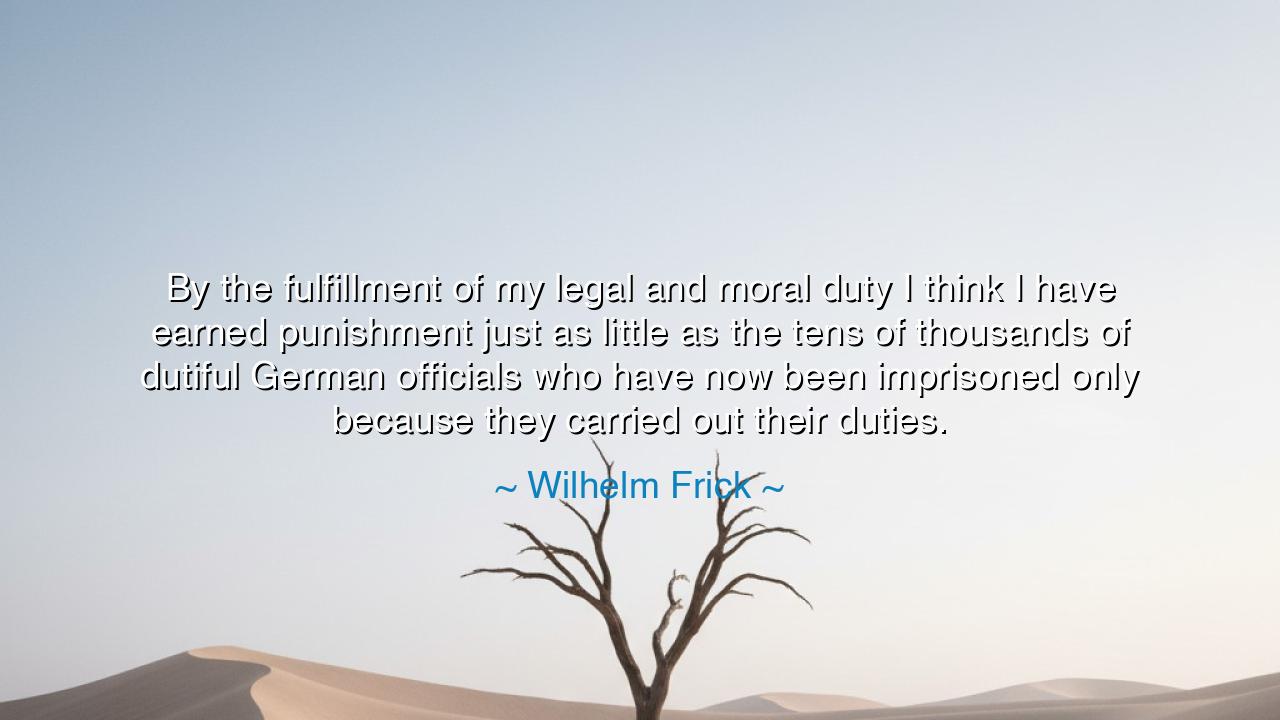
By the fulfillment of my legal and moral duty I think I have
By the fulfillment of my legal and moral duty I think I have earned punishment just as little as the tens of thousands of dutiful German officials who have now been imprisoned only because they carried out their duties.






When Wilhelm Frick said, “By the fulfillment of my legal and moral duty I think I have earned punishment just as little as the tens of thousands of dutiful German officials who have now been imprisoned only because they carried out their duties,” he spoke in the cold shadow of judgment, at the end of a life entwined with tyranny. These words, uttered before his execution at Nuremberg in 1946, reveal the tragic blindness of a man who confused obedience with righteousness, and duty with virtue. In them we hear not courage, but the echo of a delusion that has haunted humanity for centuries — the belief that one’s legal duty absolves one of moral responsibility.
Frick, who had served as Minister of the Interior under Adolf Hitler, was one of the architects of the Nazi legal system. It was he who helped craft the laws that stripped Jews, minorities, and political opponents of their rights — laws that cloaked oppression in the language of legality. At Nuremberg, facing the verdict of history, he claimed that he had only fulfilled his “legal and moral duty.” But what he called duty, the world called complicity. What he defended as legality, justice named evil disguised in law. His words were a final defense of the bureaucrat’s creed: that loyalty to authority excuses all, even atrocity.
The irony of Frick’s statement lies in the word “duty.” For in the ancient understanding, duty was not blind obedience, but a sacred harmony between law and conscience. The Stoics taught that the true duty of man was to act in accordance with reason and virtue, not decree. Likewise, the prophets of every age declared that to follow unjust orders is not obedience but betrayal — betrayal of the divine order that places morality above command. Frick, however, like many of his time, believed that the state itself was the highest law, and that serving its will, however cruel, was a kind of moral fulfillment. Thus he, and thousands like him, mistook the machinery of law for the spirit of justice.
History gives us countless examples of this error. In the courts of Rome, slaves were tortured lawfully; in the courts of Europe, heretics were burned by decree; and in the Germany of Frick’s day, millions perished under edicts signed and stamped by men who claimed they were “just doing their jobs.” Yet time, like a patient judge, exposes this deception. The Nuremberg Trials became the first tribunal to declare that following orders does not absolve guilt, that law itself must answer to a higher law — the moral law that transcends nations and kings. Frick’s defense, meant to justify his deeds, instead became the proof of his failure to understand the very essence of justice.
In his final words lies a warning to all who wield authority or serve it. Legalism without morality is the most dangerous of all evils, for it wears the mask of righteousness. When law is severed from conscience, it becomes a weapon rather than a guide. The true servant of justice must always ask: “Is this law just? Does it honor the dignity of life?” For if one obeys without asking, one becomes not a servant of order, but an instrument of oppression. Frick’s tragedy was not merely his participation in crime, but his inability to see that legality cannot cleanse immorality.
The ancients understood what Frick forgot: that duty to truth is higher than duty to power. When Antigone defied King Creon to bury her brother, she did so not in rebellion, but in reverence — for she knew that divine justice stands above mortal law. So too, in every age, the brave few who follow conscience rather than command illuminate the path for those who come after. Frick, in contrast, walked the well-trodden road of submission, mistaking silence for virtue, obedience for strength.
Thus, let this be the lesson drawn from his fall: never surrender your conscience to authority. Question the orders that offend your soul. Let your obedience be guided not by fear, but by understanding. For the measure of a person is not found in how faithfully they serve power, but in how bravely they serve truth. The legacy of Wilhelm Frick is a grim monument to the peril of blind duty — a reminder that law without morality leads to ruin, and that the only unbreakable law is the one written upon the human heart.






AAdministratorAdministrator
Welcome, honored guests. Please leave a comment, we will respond soon